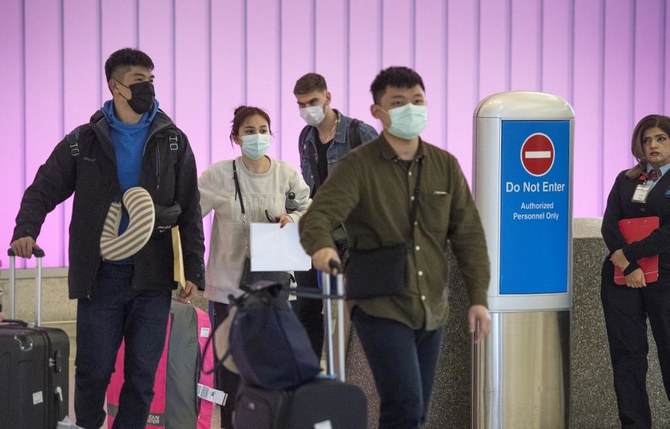BEIJING: The death toll rose to 170 in the new virus outbreak in China on Thursday as foreign evacuees from the worst-hit region begin returning home under close observation and world health officials expressed “great concern” that the disease is starting to spread between people outside of China.
Thursday’s figures cover the previous 24 hours and represent an increase of 38 deaths and 1,737 cases for a total of 7,711. Of the new deaths, 37 were in the center of the outbreak in Hubei province and one in the southwestern province of Sichuan.
The news comes as the 195 Americans evacuated from Wuhan, the Hubei province city of 11 million where the outbreak originated, are undergoing three days of testing and monitoring at a Southern California military base to make sure they do not show signs of the virus.
Meanwhile, the Philippine and Indian governments have confirmed on Thursday their first cases of the virus in their countries. EgyptAir suspended all flights to China starting Saturday, according to the civil aviation ministry.
Russia said Thursday it was closing the border with China to prevent the spread of the new coronavirus and would stop issuing electronic visas to Chinese nationals.
Prime Minister Mikhail Mishustin told a government meeting that the order had been signed "to take measures to close the border (with China) in the Far East".
"We have to do everything to protect our people," he said.
According to the government order, cross-border travel would be suspended from Friday.
A number of checkpoints will be affected, including between Blagoveshchensk and Heihe, Khabarovsk and Fuyuan, it said.
The Russian foreign ministry said that as of Thursday it would stop issuing electronic visas, which can be used to cross into parts of the Far East and western Russia, to Chinese citizens.
The foreign ministry also advised Russians to refrain from travelling to China and for those already there to get in touch with the Russian embassy.
A 38-year-old Chinese woman, who arrived in the country from Wuhan on Jan. 21, tested positive for the novel coronavirus, Health Secretary Francisco Duque told a news conference. The patient, confined in a government hospital, is currently asymptomatic.
The Indian patient in the southern state of Kerala meanwhile tested positive for the virus and is stable and in isolation at a hospital, a statement said.
The Vietnam health ministry on Thursday also reported three new confirmed cases of coronavirus, state media said.
A group of 210 Japanese evacuees from Wuhan landed Thursday at Tokyo’s Haneda airport on a second government chartered flight, according to the foreign ministry. Reports said nine of those aboard the flight showed signs of cough and fever. Three of the 206 Japanese who returned on Wednesday tested
positive for the new coronavirus, Prime Minister Shinzo Abe said during a parliamentary session. Two of them showed no symptoms of the disease.
France, New Zealand, Australia and other countries are also pulling out their citizens or making plans to do so.
Live from Geneva on the new #coronavirus outbreak https://t.co/f2fNWxSQHu
— World Health Organization (WHO) (@WHO) January 29, 2020
The World Health Organization emergencies chief said the few cases of human-to-human spread of the virus outside China — in Japan, Germany, Canada and Vietnam — were of “great concern” and were part of the reason the UN health agency’s director-general was reconvening a committee of experts on Thursday to assess whether the outbreak should be declared a global emergency.
The new virus has now infected more people in China than were sickened there during the 2002-2003 SARS outbreak.
Dr. Michael Ryan spoke at a news conference in Geneva on Wednesday after returning from a trip to Beijing to meet with Chinese President Xi Jinping and other senior government leaders. He said China was taking “extraordinary measures in the face of an extraordinary challenge” posed by the outbreak.
To date, about 99 percent of the cases are in China. Ryan estimated the death rate of the new virus at 2 percent, but said the figure was very preliminary. With fluctuating numbers of cases and deaths, scientists are only able to produce a rough estimate of the fatality rate and its likely many milder cases of the virus are being missed.

The new virus has now infected more people in China than were sickened there during the 2002-2003 SARS outbreak. (AFP)
In comparison, the SARS virus killed about 10 percent of people who caught it. The new virus is from the coronavirus family, which includes those that can cause the common cold as well as more serious illnesses such as SARS and MERS.
Scientists say there are many questions to be answered about the new virus, including just how easily it spreads and how severe it is.
In a report published Wednesday, Chinese researchers suggested that person-to-person spread among close contacts occurred as early as mid-December.
“Considerable efforts” will be needed to control the spread if this ratio holds up elsewhere, researchers wrote in the report, published in the New England Journal of Medicine.
More than half of the cases in which symptoms began before Jan. 1 were tied to a seafood market, but only 8 percent of cases after that have been, researchers found. They reported the average incubation period was five days.

















